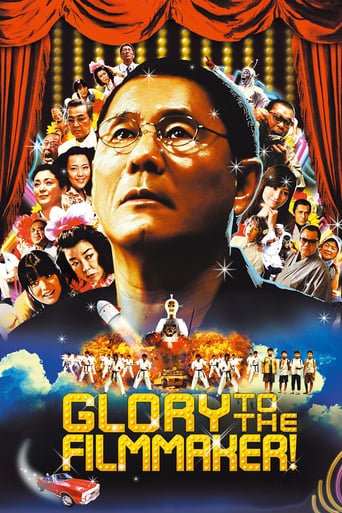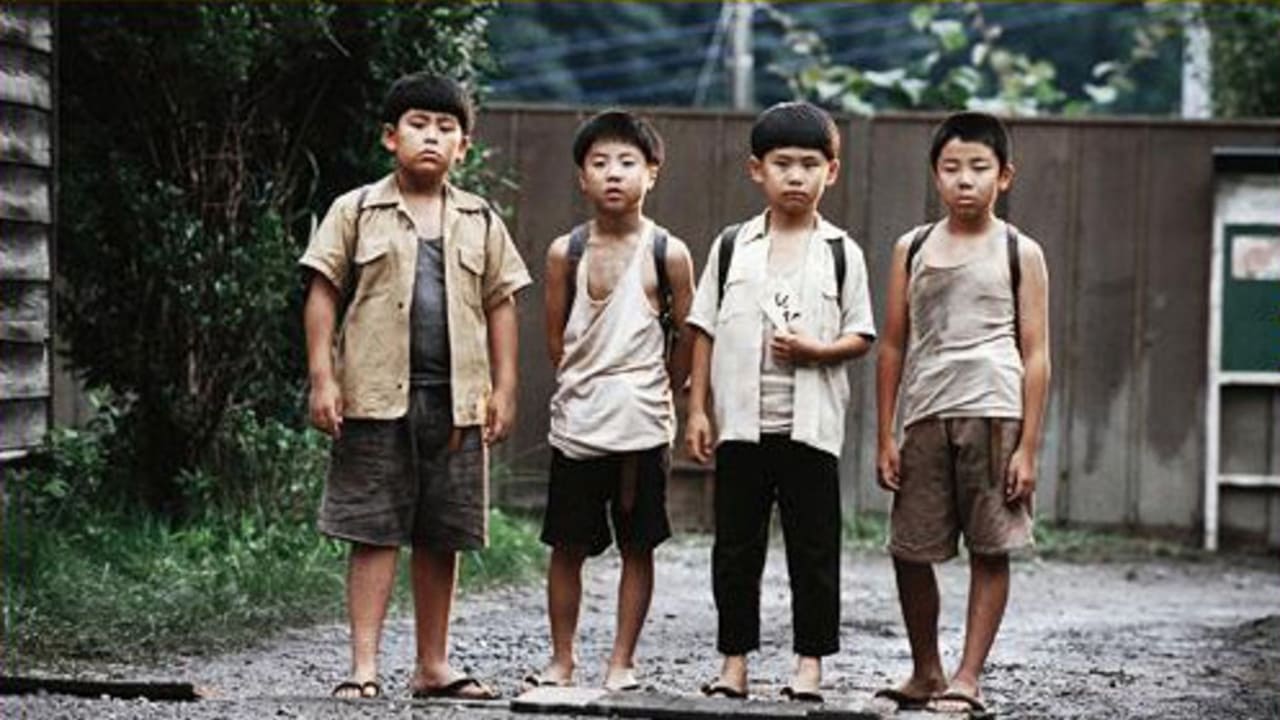hickey2
I can see why some people would hate this movie, but there are a lot of people who shouldn't miss it. I will argue that it is immensely funnier and more meaningful if the viewer: 1.) Has seen several of Takeshi's other films (at least one or two gangster ones, Kikujiro no Natsu, and Zatoichi for good measure)and2.) Is familiar with classic Japanese cinema, particularly the works of Yasujiro Ozu...but samurai and horror films are skewered here, too, so if they're more your bag, you'll still have something to relate to.Bonus enjoyment if the viewer: 3.) Has some knowledge of Japanese and can catch the nuances that subtitles can't capture--the subtitles are indeed serviceable, and my Japanese isn't good enough to understand it without them, but some of the ritual Japanese expressions I caught were uproarious in certain contexts in the filmand 4.) Has spent some time in Japan. I feel like Japanese society, ritualistic conventions, and mannerisms are lampooned often in the film, and any Westerner who is often confused or frustrated by them may find this film a relief and a delight.All in all, though, what is most necessary is an open mind. This film does not have a very meaningful ending, and even makes fun of the loose ends it leaves undone. It was made for the sake of comedy and is not plot or character-driven, so don't expect Hana-bi. If you're looking for a send-up of Japanese cinema (including the director's own works) and some completely ridiculous, from-way-out-in-left-field humor, check out Glory to the Filmmaker. Some of the gags do fall painfully flat, but even some of the really silly stuff made me laugh harder than I have at any other film in quite a while. Some of the film parodies are pretty subtle and understated, where you could *almost* take them seriously if they weren't in the context of such a ridiculous film, but since the movie makes it clear from the start that everything's a joke, you'll find yourself laughing out loud at the little things that are deliberately askew in them. The narrator is wonderful, too, and is responsible for a good portion of the laughs in the film. Personally I found this more accessible and far more enjoyable than Takeshis', perhaps because unlike that film, the director's intentions are clear here from the start: he's just doing it for the laughs.
K2nsl3r
Beat Takeshi's Glory to the Filmmaker, in the first instance, is difficult to rate. Its merits are clear, but its failures are even more striking. It is second in his supposed trilogy of self-critical, self-reflective, self-mocking metamovies. Having given up on his increasingly mainstream audiences (the accolade he received after Zatoichi), Beat Takeshi is trying to bring the "Beat" back into the mix. It remains an open question whether his methods are to be applauded or lamented. Here, in this film, Kitano widens the schism between himself, the auteur, and the movie-going audiences, by techniques of alienation that are borderline sado-masochistic. The salvaging fact is the comedy of the film, which shows Kitano's long-standing background as a comic. He has shown this side of his psyche only very rarely in his films. So, I am torn between appreciating the light-hearted spirit of the film and castigating, as I should, its heavy-handed pacing and direction.But let's look back for a moment... The film that started off this self-reflective trilogy two years ago, Takeshis', I really enjoyed (especially after repeated viewings), because it culminated his career up to that point. This current film does not achieve, or even try to achieve, anything of the sort. It does not reflect back as much as make fun of any sense of history and continuity. It is a meta-movie, a non-movie, a post-movie... and, underneath it all, a series of quirky scenes, gags and fragmentary ideas. The humour of the film is its driving force, making it closer to his comedy Getting Any (1995) than anything he's done before or since. But one has to wade through a pool of dragging nonsense to get to those tasty bits, for which reason I cannot recommend this film as a comedy.At parts, I found the film pretentious, self-righteous and uninvolving. In a word, it's too self-conscious to be a comedy. During some other scenes I was completely at loss of words (whether because of the film's absurdity, incoherence or its complete disregard for the audience), to the degree that I simply decided I would postpone my judgment for some other day... Well, that "other day" is today, but I still can't make up my mind... The movie disarms the viewer, but it does not live up to much, either. It's like an extended foreplay.All in all, one has to appreciate Kitano's vision and uniqueness, but this film works best as a meta-statement of the art of movie making and not so well as a comedy, a drama or anything else. Most viewers will probably find it to be, rightly or wrongly, an irredeemable piece of trash.I kinda liked it. It's not good enough to classify as Dada, but it's just a notch above kitsch.
Harry T. Yung
Seen in the Toronto International Film Festival After a series of Kitano classics culminating in the highly and widely acclaimed "Hana-bi" (1997), the master of avant-garde Japanese gangster movies wanted to venture into other genres. "Kikujiro no natsu" (1999), a heart-warming road movie (in some ways not unlike Brazil's "Central Station" (1998)) is a favourite of mind. After another brief re-visit to the gangster genre with "Brother" (2000), he tried something else rather surreal "Dolls" (2002) which received a general verdict of beautifully filmed but too obscure to understand. Then came a very main-stream "Zatoichi" (2003), his reinvention of the popular iconic blind swordsman in the 60s, which was good enough to win the "people's choice" award in that year's TIFF. But it has been 4 years since then and there was nothing of any significance coming out of him This latest work, "Glory to the filmmaker" seems to serve a dual purpose yet another attempt to do something different, and also his own personal statement about his frustration with not having any more inspirations. There could actually be a third message, a lament of the current state of affair of the Japanese film industry.The movie starts by showing Kitano's proxy, a full-size blown-up doll of himself, going through a series of medical tests, ending with a scene in the consultation room where the doctor says to the doll, "Next time, send himself". It's kind of difficult to decide which one of them is more expressionless, the doctor or the doll.In the rest of the movie, we see Kitano walking around with this doll, as well as appearing in scenes interchangeably, as the plot (if it can be said to have one) unfolds under an ever-present voice over narrator. Essentially, the first half is about numerous attempts he himself makes with various genres, from traditional Ozu to trendy Hollywood CGI Sci-fi, and everything in between. The second half seems to talk about what he finally ends up making, a story about a mother-daughter team of con artists whose target is a character played by himself. Playing the daughter is 20-year-old Anne Suzuki who, after some minor roles, came to herself in "poetic director" Shunji Iwai's "Hana and Alice" (2004) and later took part in "Initial D" (2005), Hong Kong's rendering of Japan's immensely popular car racing manga.Turning back to "Glory to the filmmaker", the material in the loosely linked comic sketches appears to be drawn from Kitano's own earlier standup comedy routines as well as Monty Python, the two prime suspects. There are some really funny moments but the movie is not devoid of stretches of banality. The most brilliant gag is an illuminating comment made by one of the characters toward the end, to the effect that whenever times go rough, our protagonist would turn into a mute blown-up doll. What empathy! Isn't that what we all would love to do.The movie concludes with a very clear message. Kitano is back in the consultation room, himself rather than the doll, to hear the final diagnosis. "There's a problem with your brain," explains the doctor, "it's broken".
Richard
I saw this film at the 2007 Toronto International Film Festival.Glory to the Filmmaker! is the latest work from the mind of Takeshi Kitano. Featuring a slightly fictionalized version of himself, the film follows Kitano in a search for his next big hit, following his public declaration that he would stop doing Yakuza movies. In a wild and funny journey, Kitano takes us through his failed, aborted, and commercially unsuccessful attempts, featuring a number of co-stars from his past movies. The journey spans every genre imaginable, from a quiet, introspective story of a just-retired salaryman (reminiscent of the works of Ozu), to a ninja action film, to multiple relationship stories, to a film set in the 50's recalling the hardship and depression of post-war Japan, before finally settling on an offbeat sci-fi flick.That film is ostensibly about an asteroid hurtling towards Earth, but soon diverts to a story about mother-daughter con artists who are trying to scam Kitano's character, an aide to an eccentric rich man who funds all sorts of oddball causes. All the while, Kitano is constantly changing into a life-sized doll version of himself. And if none of that makes any sense, then you've pretty much captured the feeling of watching that part of the movie.Kitano was not present at the screening, but he (or rather, his doll surrogate) taped an interview for the festival that preceded the film, which pretty much set the tone for what was to follow. The film is about as self-referential as his last work screened at the festival, Takeshis'. The first half of the movie was surprisingly accessible and hilarious, but the second was as impenetrable, surreal, and self-mocking as you'd come to expect of Kitano's later work. Not that that is a bad thing, but don't come into it expecting anything resembling a straightforward narrative. If you're a fan of Kitano's work and his fertile imagination, then you'll enjoy the film, but I imagine many others will be lost in the last half of the picture.


 AD
AD



